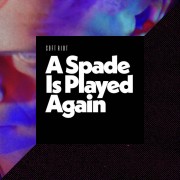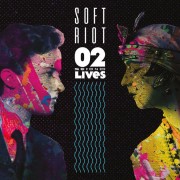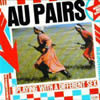
No. is the tenth Soft Riot album by Glasgow-based Canadian synth auteur Jack Duckworth (also known as JJD). With origins from the mid-nineties in the vibrant art-punk/hardcore dominating the West Coast American/Canadian underground at the time, he has clocked in over twenty five years of musical output in various bands and projects, including first-wave post-punk revivalists Radio Berlin (1998-2005) and industrial synth-punk collective A Luna Red (Gold Standard Labs, 1999-2003).
No. is the logical follow-up to When Push Comes To Shove, released in November 2019 on the Glasgow UK-based label Possession Records, which saw some critical acclaim in the increasingly diverse synthwave scene — a crystallization of the artist’s signature “SynthLord” sound.
With No. things have been shaken up and pushed into new directions. Many different factors came into play, including the conditions of the pandemic lockdowns and an urge for listening to music favourites from beyond his own scene informed developments on this new record. One key feature of these tracks is that under these conditions they were developed as individual pieces — a constrasting approach from previous albums where tracks were written with an album in mind. An evaluation of all of these individual tracks in the summer of 2022 unveiled a common pattern going through these new compositions.
One can still hear any number of echoes of the spirits of original synth artists in his sound, such as Images in Vogue, The Box, Section 25, Thomas Dolby, Skinny Puppy, Chrome, Cabaret Voltaire, Fad Gadget, Japan and Bill Nelson. However, some of Jack’s halcyon punk influences surface as well, taking inspiration from legendary punk/hardcore labels such as Dischord and Gravity, as listening habits over pandemic steered back towards more guitar-based styles. The introduction of expanded production techniques, experiments with vocal styles and tones, and stylistic shifts mark a progression of Soft Riot’s sound. The result is a snarkier, urgent and more playful, with a focus on pure synthpop, new wave, art-punk, proto-EBM as well as grittier synth-punk and post-punk tones.
LP / Digital Album

A Spade Is Played Again is the first of two digital single releases from the 2023 album No. With a different, original version of this track on the 2021 compilation Dream Baby Dream Volume 1, this extended single contains a newer version of the titular album track “A Spade Is Played Again”.
The second variation, “A Spade Is Played Again (Breakdown Version)”, is an alternate Soft Riot version of the track, twisting the original far more into grainy post-punk territory. Having put down the guitar for synths since the start of the Soft Riot project, the “axe” is dusted off for this special version, providing shards of metallic noise and dubbed out noise-rock fragments over a propulsive beat.
Also included are two further versions of this track, the first variation being a collaborative rework of the title track, named “Rebuilding It Again” by Berlin-based DJ/electronic artist Carlos Grabstein, otherwise known as 89st, who runs the Berlin-based electronic label Miseria Records.
The second is a remix by Halicon — the moniker of Dayton, Ohio-based musician Tim Krug. An old friend from the days of touring in North America back in the 2000s, Krug is also known for work in other projects including Hexiadiode, Oh Condor and Brainiac.
Closing up this release is the non-album track “No Strings Attached”, which was originally intended to be the opening track on the No. album and was recorded and mixed with all of the tracks from that album but was not selected for the final album release. One of the shorter Soft Riot album tracks that has ever been released, it has a creeping, chromatic and slightly cinematic feel, with its lyrics suggesting imagery of “opening a scene” for some abstract, non-existent piece of thriller cinema.
Digital Album

Marking just over ten years since the original No Longer Stranger EP back in early 2011, it’s now been a decade since Soft Riot has been in existence. And on that touchstone comes the newest release called Second Lives, a compilation album featuring a collection of eight tracks of previously released tracks from obscure singles on various compilations, re-worked versions of previously released older tracks as well as some unreleased material.
Originally the concept for such a release was to be a more comprehensive archive of unreleased material that has been collecting over the past decade, including demos, odd bits and other ephemera, but with this final version as Second Lives, sees the release fine-tuned into an album of its own right, focusing on key tracks and bringing out their strengths, updating old tracks — often ones that are still played out live — to give them new life and perspective.
CD / Digital Album

Chin Up is the eighth album by Soft Riot and a unique one in the Glasgow-based Canadian artist’s catalogue. Written mostly at the same time along with the material pressed onto his latest album, When Push Comes To Shove (Possession Records, Nov 2019) — it’s a very different sound, tying in more on a different trajectory of the artist’s output that includes 2014’s soundtrack styled album Some More Terror or even Soft Riot’s initial release, 2011’s No Longer Stranger.
Chin Up contains 11 tracks of what might be loosely described as “ambient synth pop” with a running time of almost an hour. It is in a way a mirror release to When Push Comes To Shove as both records share the same approach to composition, sound design and production techniques but with different results. When Push Comes To Shove, being a milepost in Soft Riot’s main timeline of experimental, auteur synth pop, provides the extrovert side of JJD’s artistic output — an active listen that sounds suitable in a club or other energetic environment. Chin Up is a reflective mirror to these qualities; being the darker introvert counterpart, in a more sporadic, alternative timeline — a passive listen more suitable for the depths of the night after the everything has closed, alone in your apartment.
It’s a very personal release, written in the late night hours as an escape from the trappings of things like culture, scenes, political calamity, information overload, existential dread and the confines of what is considered synthesizer pop music. Its genesis is rooted in a feeling of endless grey malaise, especially in the record’s long and labyrinthine feel — but then taking that initial idea and expanding its colour. There’s a fine balance that’s carefully engineered throughout the record; a balance between creeping dead, melancholy and a sense of finding a moment to rest and internal resolve.
The result is a record full of large cavernous spaces where all of the instruments are placed with careful distance in that space. It’s synth pop shifted into new bearings, where styles of ambience, drone and soundtrack-influenced ideas make themselves the foremost presence.
CD / Cassette / Digital Album

When Push Comes To Shove is the seventh studio album by Soft Riot, the stylised musical alter-ego of Glasgow-based Canadian artist JJD .
Resonating with references from all corners of the synthpop’s origins (DAF, Fad Gadget and John Foxx to name a few), Soft Riot’s latest release nonetheless manages to retain its own individual voice, melding and reinterpreting its antecedents with a personal twist and an impressive demonstration of synth-craft and programming. Following on from 2018’s The Outsider in the Mirrors, these ten tracks represent a change in themes and an evolution in production and sound.
The forthcoming single and album opener “Taking The Edge Off” sets out the Soft Riot manifesto, a propulsive future-synth tale of forging ever-forwards in an increasingly noisy world. “It’s No Laughing Matter” is a hedonistic yet propulsive dance-floor slammer — shades of minimal synth and metallic Belgian new beat condense in side one closer “Fate’s Got A Bone To Pick With You” and the dizzying italo-matic muscle workout “Don’t Get Yourself Bent Out Of Shape” is the ultimate self-help smack down.
Although there’s no overarching concept to the album, Soft Riot has used this release as platform to experiment with his own concept of “déja vu”, using minute details of musical phrases and lyrics that have been used before in previously released Soft Riot material, and even between songs on this album. Some of these mirrored details are very subtle and would only be picked up by someone who has listened to all of the material up until now. It could also be the underlying black humour of Soft Riot’s work, mischievously playing off the old saying “it’s all been done before”.
The tracks were all composed in an extended hiatus from live performance between November 2018 and January 2019; a deliberate move on the part of JJD in order to foster a more focused creative atmosphere and allow for the writing process to have a more intuitive flow. This also allowed for a deeper exploration of sound design of his equipment, with this release utilising a range of different synths, something that reflects in the depth and richness of the new album’s sounds.
LP / CD / Digital Album
|






